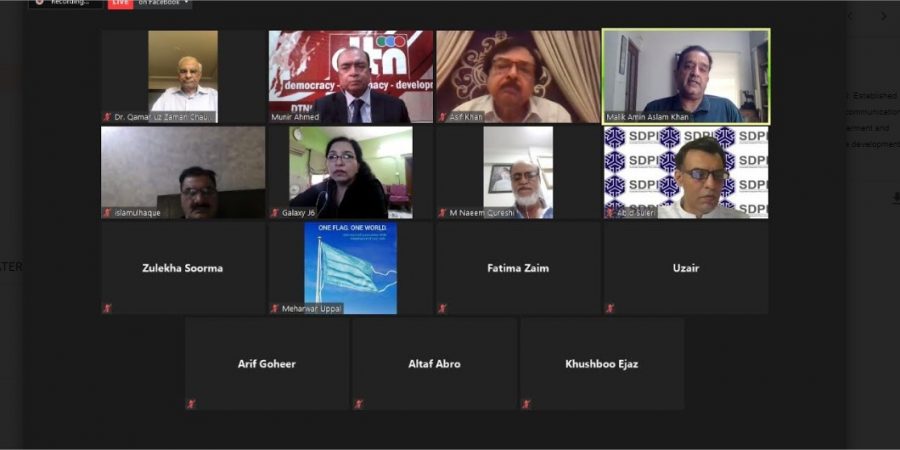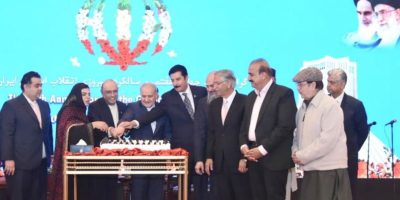Experts, civil society reps urged provinces to take up climate actions in letter and spirit

ISLAMABAD, JULY 18 (DNA) – Environmental experts while speaking to a webinar participants have expressed that Pakistan’s green initiatives would bring positive change in the local environment, reduce vulnerability to natural disasters, and improve social health and economic conditions if implemented in letter and spirit.
They mentioned that the outcome of Pakistan’s climate action would contribute to the regional and global targets detailed in the relevant Sustainable Development Goal (SDG-13) in enormous ways. However, they said, the success of the initiatives depend on the effective role of provincial and local authorities, communities and other stakeholders and partners.
Development Communications Network (Devcom-Pakistan) and DTNTV organized the webinar on the subject “SDG-13: Pakistan’s Climate Action – Prospects for Socioeconomic Development” on Saturday. Devcom-Pakistan and DTNTV Director Munir Ahmed hosted and conducted the webinar.
Malik Amin Aslam, Federal Minister and Prime Minister’s Advisor on Climate Change, was the keynote speaker. The panel of experts included Asian Development Bank Climate Scientist and former chair of the National Climate Change Taskforce Dr Qamar-uz-Zaman Chaudhary, Sustainable Development Policy Institute (SDPI) Executive Director Dr Abid Qayyum Suleri, EMC Chief Operating Officer and former Director General Pak EPA Asif Shuja Khan.
Malik Amin Aslam said: All SDGs are interconnected, so the highly significant initiatives and achievements on Pakistan’s climate action agenda would not be contributing to the SDG-13 but these interventions would have positive effect on other SDGs too. Our green initiatives have been admired by all leading forums and organizations including IUCN, WWF, and World Economic Forum.
Citing the Pakistan government interventions, Malik said, Pakistan’s continuous efforts and initiatives of large-scale afforestation, biodiversity conservation, investment in clean energy, electric vehicles and green jobs to combat climate change impacts have earned the country worldwide acclaim.
He said, the 10 Billion Tree Tsunami Program, Clean Green Pakistan Initiative, Clean Green Pakistan Index, Protected Areas Initiative adding nine more national parks to the existing six, Ecosystem Restoration Fund for facilitating green growth and policies consistent with the objectives of Pakistan’s Nationally Determined Contribution and attaining Land Degradation Neutrality. These initiatives have been taken to prevent and to be better prepared for the threat of climate change experienced by the country such as floods, heat waves, droughts and melting glaciers.
Malik mentioned that Transition to a green economy and green future is at the core of Pakistan government’s policies spearheaded by Prime Minister Imran Khan. The government has initiated steps to “convert China Pakistan Economic Corridor (CPEC) project into the China Pakistan Green Economic Corridor project.”
“We have deferred 2740 MW of imported coal projects signed by the previous government and replaced it by zero-carbon and hydropower projects of 3700 MW. Government’s shifting to clean energy shows its commitment to climate-friendly and sustainable development beneficial for both Pakistan and the global community.
All the benefits of Pakistan’s Climate Action would also harness socioeconomic benefits at the grassroots level where an improved environment would also contribute to health and hygiene, Malik added.
Dr Qamar-uz-Zaman Chaudhary, Asian Development Bank Climate Scientist and former chair of the National Climate Change Taskforce, said: Climate change is a bigger challenge than the Covid-19 pandemic. Fast depleting natural resources would hamper the socioeconomic fiber of the society that would lead to intensive internal migration towards the areas having better economic prospects.
He said only sustainability of the government’s climate initiatives would add value to the socioeconomic indicators. Engagement of local governance and communities would make them a big success. We have cut down 20 percent of our carbon emission under the Paris agreement while the green initiatives would enable us to do much more than the actual target.
Dr Abid Qayyum Suleri, Executive Director of the Sustainable Development Policy Institute (SDPI), said: Socioeconomic impact of Pakistan’s Climate Action interventions depend purely on its sustainability. In the age of cartels and mafias, the government has to be vigilant if the multinationals and corporates are taking the government directions and notifications seriously. Oil and gas companies should have to be monitored if they genuinely supply Euro-5 fuel in the market after agreeing with the government.
While paying heavy tariffs to the Chinese international power projects even for the unused energy, the production and tariff of the renewable energy would make a difference in the economic development and productivity. The big menace is the 2.2 trillion debt circle that is hammering the national economic growth. The other cartel, Dr Suleri said, is the vehicle manufacturing companies that get the word ‘four-wheeler’ out of the Electric Vehicle Policy and from the budget documents at the last minute.
Dr Suleri said the World Bank has swapped $188 million debt to nature and green projects. But the government has no capacity to develop projects, even no funds to hire the consultants to do it.
Devcom-Pakistan and DTNTV Director Munir Ahmed said:
Asif Shuja Khan, Chief Operating Officer EMC and former Director General Pak EPA, said: The core essence of the SDG-13 is to make the country resilient to natural disasters. The federal initiatives are not reaching the communities because the provinces have yet to develop and adopt the climate change policies with defined objectives and targets. Only the environment was devolved to the provinces, climate change still is a federal subject and the federal government should take it up with the provinces in letter and spirit.
Environmental journalist Shabina Faraz said we need to protect trees besides planting new saplings. Government should have strict penalties for those chopping off trees. Who would notice a plantation that is only done on papers to deceive the nation and to steel the national exchequer? DNA
==============
Related News

Pakistan assures BAT of policy reforms to curb Illicit tobacco trade
ISLAMABAD, FEB 12 /DNA/ – Federal Minister for Finance and Revenue, Senator Muhammad Aurangzeb, heldRead More

President warns escalation involving Iran could destabilize region
DNA ISLAMABAD, President Asif Ali Zardari on Wednesday welcomed the efforts aimed at easing tensionRead More


Comments are Closed